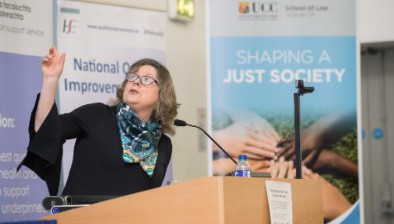High Court: Ward not entitled to costs order against HSE

Andrew McKeown BL
The High Court has held that a ward is not entitled to a costs order against the Health Service Executive (HSE).

About this case:
- Citation:[2020] IEHC 487
- Judgment:
- Court:High Court
- Judge:Ms Justice Niamh Hyland
Background
TH, now 83 years of age, was admitted to hospital in October 2018, and he had a diagnosis of dementia. By 19 December 2018, he was medically fit for discharge, but the hospital staff were concerned that TH could not look after himself because of his dementia. They were of the view that the system of support in his local community was no longer sufficient to manage his care needs.
The HSE’s solicitors wrote to the Office of the Wards of Court on 19 December 2018 outlining its concerns and asking the President of the High Court to consider requesting a Medical Visitor to attend on TH. Mr Justice Peter Kelly, the then president, directed Dr Justin Brophy to act as Medical Visitor pursuant to Lunacy Regulation (Ireland) Act 1871 s.11. Dr Brophy conducted a capacity assessment, and concluded that TH was of unsound mind and incapable of managing his affairs.
In February 2019, Mr Justice Kelly directed that the matter proceed by way of Petition for an inquiry as to TH’s soundness or unsoundness of mind under s.12 of the 1871 Act. He directed that the HSE serve the petition and have carriage of the report and proceedings.
Having sought examinations by two experts, in the end TH did not oppose wardship.
Order of costs
Michael Ward Solicitors applied for the costs of representing TH in the wardship proceedings that ultimately resulted in TH being made a ward of court in July 2019. The solicitors sought costs against the HSE even though TH ultimately did not oppose the petition to take him into wardship after his solicitors obtained two medical reports on his behalf, both of which stated that he lacked the necessary capacity.
Counsel for TH said that the entitlement of a respondent to a wardship petition to be heard and, if necessary, legally represented was recognised in AM v Health Service Executive [2019] 2 IR 115.
The HSE resisted an order of costs, stating that no request was made of it in advance of any legal services being provided to TH for the HSE to discharge such costs. It argued that it was not the petitioner in the application, and that it had acted in strict compliance with its statutory obligations in relation to the promotion of TH’s health and welfare in notifying the Wards of Court office of his situation in December 2018.
The HSE stressed that no application was made for a detention Order, and said that the fact that the HSE have a practice of paying for a guardian ad litem or legal representation in cases where they are the petitioner, and are seeking to detain respondents or provide compulsory medical treatment, cannot be the basis for an obligation to discharge costs in this case.
Further, the HSE noted that the opposition to the wardship inquiry was not pursued.
The General Solicitor for Minors and Wards of Court made submissions on the law and practice relating to costs applications pursuant to s.12 and s.15 of the 1871 Act. She observed that the issues of costs related less to the right of a respondent to the benefit of legal advice and representation and more related to how this is to be funded.
Ms Justice Niamh Hyland said that even where the outcome of the inquiry is that the respondent is not taken into wardship, costs may be awarded against the respondent in favour of the petitioner. She cited the judgment of Chief Justice Hugh Kennedy in In the matter of MJ a person alleged to be of unsound mind [1929] IR 509, and of Mr Justice Joseph Finnegan, then President of the High Court, in In re Catherine Keogh (Unreported, 2 Oct 2002) in this regard.
All the parties expressed reservations about the application of the Legal Services Regulation Act 2015 ss.168 and 169 and Ord.99 RSC. Counsel for TH asserted that the normal costs rules must be viewed in the context of the overriding importance in wardship proceedings that the voice of the intended ward be heard.
Nonetheless, s.168 and 169 and Ord.99 RSC remain potentially relevant in a wardship inquiry, with the judge noting the judgment of Mr Justice Denis McDonald in In The Matter Of The Appropriate Care Of A Ward Of Court [2020] IEHC 20, where he applied the normal cost principles of Ord.99 in the warship context. Ms Justice Hyland noted that he was not dealing with an inquiry but rather with care orders once a person had been taken into wardship.
TH resides in a nursing home. He owns a property valued at approximately €220,000.
Ms Justice Hyland held that the costs should be borne by the estate of the ward, from TH’s own resources. In so doing, she placed particular emphasis on the fact that the court has explicit jurisdiction to make orders directing that costs be paid out of the estate of a ward of court. Further, she held that the costs in question were incurred representing TH’s interests and on his instruction, and the HSE cannot be viewed as an “unsuccessful” party within the meaning of the Legal Services Regulation Act 2015 s.169 for the purposes of costs.
She noted that TH’s solicitors did not seek to agree with the HSE in advance that the costs of his representation would be borne by the HSE, and that TH’s estate has sufficient means to discharge the legal costs when measured.
The judge found that the right of a ward to have his or her voice heard can be vindicated “just as effectively by an intended ward bearing the costs of legal representation from their own funds, where appropriate, as by a third party bearing those costs”.
Conclusion
Accordingly, the judge said that the measured costs of the legal representation provided by solicitors and counsel for TH in respect of the petition for an inquiry is to be borne out of the estate of the ward, and the court so ordered.











